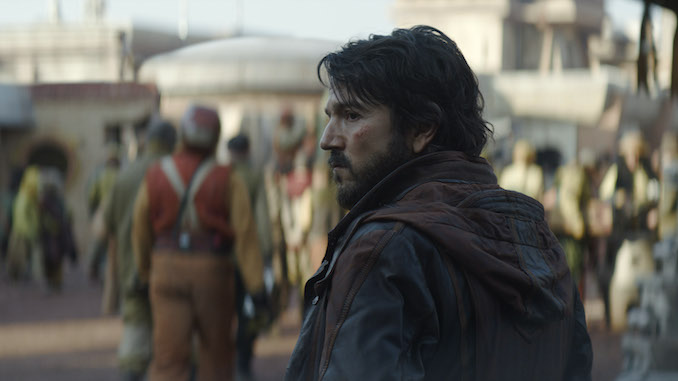Cassian Andor: The Spy Who Came in from the Cold
Photo Courtesy of Disney+
Editor’s Note: Spoilers for Rogue One and Le Carré’s “The Spy Who Came in from the Cold” within.
The 21st-century spy is a postmodern figure. They are suspicious of great causes like “spreading democracy,” and jaded about power. Their villains usually come from trusted American institutions (“Treadstone,” CIA, FBI, etc.) that lay claim to the greater good. They find salvation by shucking the strict right and wrong of global politics, sticking to their own moral compass, and doing right by their loved ones. They transcend ideology and bet on themselves. Andor’s showrunner, Tony Gilroy, knows such characters intimately—he worked on all of the Bourne Trilogy’s scripts.
In Andor, Cassian Andor and Luthen Rael aren’t cast from the Jason Bourne mold, though. They’re Cold War spies. They live in a reality cut in two by a simple axis: Empire or Rebel, fascist or freedom. Their work in espionage is drab, punctuated by a few staccato moments of terror. It’s not superheroic or thrilling. It’s filled with common lies, dead drops, and worry. As they furtively scrape at the legs of a colossus, they live mean existences. They fear that their methods are beginning to match their enemy’s. They fear that the chance at a boring, normal existence is slipping away and taking happiness with it.
Luthen, the elder spymaster, has already made his peace with that. In Season 1, “One Way Out,” he says:
I’ve given up all chance at inner peace. I’ve made my mind a sunless space. I share my dreams with ghosts … I yearned to be a savior from injustice without contemplating the cost and by the time I looked down there was no longer any ground beneath my feet … I’m condemned to use the tools of my enemy to defeat them. I burn my life to make a sunrise that I know I’ll never see. And the ego that started this fight will never have a mirror or an audience or the light of gratitude.
Cassian hasn’t accepted this reality. After Aldhani, he rejects commitment to the great cause. He clings instead to his adoptive mother, Maarva, and rumors of his sister. Luke Skywalker longs for adventure away from his mundane home, yet Cassian longs to piece together a nuclear family, even as the Empire’s encroaching darkness extinguishes his hopes one by one.
It’s a presentiment. It’s as if he knows where Luthen’s path will take him: to a beach beneath the shadow of the Death Star. His only audience will be a woman slated to die beside him. Every step he takes toward the Rebellion brings him closer to Rogue One.
Before Andor, John le Carré plumbed these dark depths with his 1963 masterpiece, The Spy Who Came in from the Cold. Le Carré wrote it “at the age of 30 under intense, unshared, personal stress, and in extreme privacy.” It carries an autobiographical edge. He was undercover himself, an intelligence officer posing as a junior British diplomat.
Its hero, Alec Leamas, ends up in the same bleak place as Luthen. “What do you think spies are: priests, saints, and martyrs?” he snarls. “They’re a squalid procession of vain fools, traitors too, yes: pansies, sadists, and drunkards, people who play cowboys and Indians to brighten their rotten lives. Do you think they sit like monks in London balancing the rights and wrongs?”
But before that, Leamas unexpectedly falls in love with a girl named Liz. As he waits on a KGB contact, he daydreams about what will come after:
There was a girl standing on the beach throwing bread to the seagulls. Her back was turned to him. The sea wind played with her long black hair and pulled at her coat, making an arc of her body, like a bow strung towards the sea. He knew what it was then that Liz had given him; the thing that he would have to go back and find if ever he got home to England: it was the caring about little things—the faith in ordinary life; the simplicity that made you break up a bit of bread into a paper bag, walk down to the beach and throw it to the gulls. It was this respect for triviality which he had never been allowed to possess; whether it was bread for the seagulls or love, whatever it was he would go back and find it; he would make Liz find it for him.
-

-

-

-

-

-

-

-

-

-

-

-

-

-

-

-

-

-

-

-

-

-

-

-

-

-

-

-

-

-

-

-

-

-

-

-

-

-

-

-








































